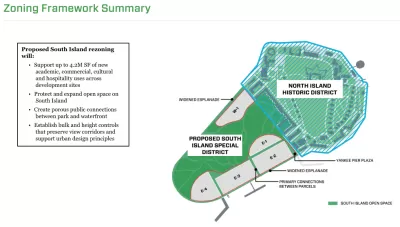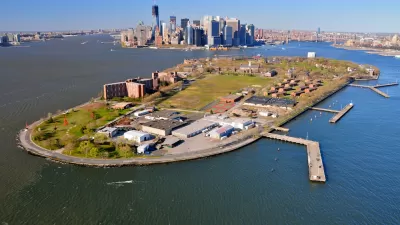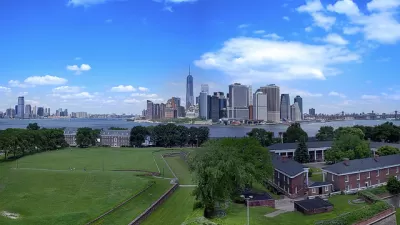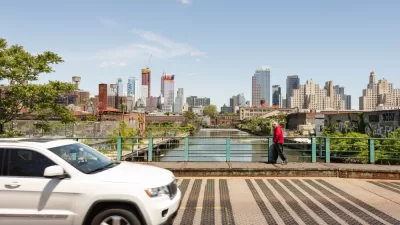A mix of new development focused on future needs and new tools for preservation are included in the rezoning package for the south end of Governors Island approved by the New York City Council in May.

"Four million square feet on the south end of Governors Island was just approved for rezoning by the City Council," reports Michelle Colman.
"The 34 acres of the newly rezoned area makes way for the construction of university space, hotels, offices, research facilities and retail," according to Colman.
As for the zoning nitty gritty, Colman provides this summary of the details of the rezoning: "The new zoned area includes a building heights cap, overall square footage maximums, limitations on intrusions on public space, increased ferry service, and caps on the amount of office and hotel space."
According to a separate article by Kathryn Brenzel, the rezoning underwent some changes on the way to City Council approval, including height and square footage limitations. "Adjustments to the proposal — including the height caps, addition of increased ferry service and limitations on intrusions on public space — were made after Chin and community board members raised concerns about the scale of the potential development," according to Brenzel.
As noted in both articles, the developments now possible by the rezoning of the south end of the island are expected to generated revenues that help maintain the island and continue to attract a year-round flow of visitors.
When Planetizen first picked up news of the rezoning process for the south end of Governors Island, news coverage focused on aspirations for a climate change research center on the island. The approved rezoning still allows the space for that programming, but with no tenant or construction timeline set.
FULL STORY: New York City Council approves Governor's Island rezoning

Alabama: Trump Terminates Settlements for Black Communities Harmed By Raw Sewage
Trump deemed the landmark civil rights agreement “illegal DEI and environmental justice policy.”

Study: Maui’s Plan to Convert Vacation Rentals to Long-Term Housing Could Cause Nearly $1 Billion Economic Loss
The plan would reduce visitor accommodation by 25% resulting in 1,900 jobs lost.

Why Should We Subsidize Public Transportation?
Many public transit agencies face financial stress due to rising costs, declining fare revenue, and declining subsidies. Transit advocates must provide a strong business case for increasing public transit funding.

Wind Energy on the Rise Despite Federal Policy Reversal
The Trump administration is revoking federal support for renewable energy, but demand for new projects continues unabated.

Passengers Flock to Caltrain After Electrification
The new electric trains are running faster and more reliably, leading to strong ridership growth on the Bay Area rail system.

Texas Churches Rally Behind ‘Yes in God’s Back Yard’ Legislation
Religious leaders want the state to reduce zoning regulations to streamline leasing church-owned land to housing developers.
Urban Design for Planners 1: Software Tools
This six-course series explores essential urban design concepts using open source software and equips planners with the tools they need to participate fully in the urban design process.
Planning for Universal Design
Learn the tools for implementing Universal Design in planning regulations.
Caltrans
Smith Gee Studio
Institute for Housing and Urban Development Studies (IHS)
City of Grandview
Harvard GSD Executive Education
Toledo-Lucas County Plan Commissions
Salt Lake City
NYU Wagner Graduate School of Public Service





























